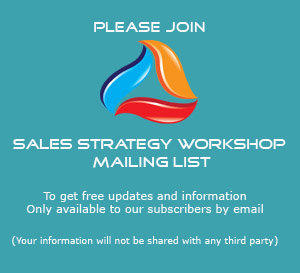No Sales Questions, No Sale
Everyone talks about how essential sales questions are, but why? Understanding how and when to use sales questions in the sales process can significantly impact your sales results. To master sales questions, I thought we should talk about why you need to take the time to learn how to use them. This is the second part of our series on sales  questions. If you missed it, Read: Why, The Importance of Sales Questions – Part 1. Here are my top five reasons why you should invest in learning how to use sales questions.
questions. If you missed it, Read: Why, The Importance of Sales Questions – Part 1. Here are my top five reasons why you should invest in learning how to use sales questions.
1. Use Sales Questions to Gain or Maintain Control of the Sales Call
Don’t lose control of the sales process. Keep asking questions, and the prospect has to follow.
Asking questions helps you maintain control of the sales process and allows the prospect to verbalize their concerns. When the prospect gets to verbalize their concerns and needs, they better understand what they want and need, and so do you. This allows them to make good decisions easily and will enable you to help them. This is important in the first two stages of the presentation sales process, the warm-up and the need analysis. Sales questions are also crucial in the test close and the final close.
2. Use Sales Questions to Isolate Areas of Interest
One of the most significant issues for salespeople is that they assume they know why someone will buy their product. You can’t assume anything when you go into the sales process. You must find out why they will buy your product, and you want them to tell you. What are they looking for? What is the prospect interested in? What is the problem they want to solve? How will they make the buying decision? Asking sales questions is the only way to find this out.
You have to isolate their areas of interest. You can’t do this by telling. You do it by asking. You have to use sales questions. If you can get them to tell you what they are specifically interested in, you can better position your product or service.
By using sales questions to isolate areas of interest, you gain a clear advantage over the competition. You know what you need to do to make the sale.
3. Use Sales Questions to Acknowledge a Fact
When you talk, you hope the prospect is listening. But what does the prospect hear? One of your goals is to ensure they agree when you make an essential point. You can use sales questions to have them tell you that they agree.
When you present your prospect with a solution that could provide them with added labor savings, don’t just throw it out and move on. Ask them a question to ensure they feel your solution will give them the savings they want before you talk about price or move into a close. You need them to acknowledge that fact. You need to use a sales question like:
“We feel that this solution will save you as much as 10% in labor cost, wouldn’t you agree?”
When they agree, they acknowledge this as a fact they believe. This brings you closer to winning the sale. What if they disagree with this assumption? That’s fine. You now have a better understanding of what you need to do. It would help if you found out why they disagreed, rework your assumption, and ask again. The key is understanding that you can’t close until they agree when they do agree. You can move on.
When a fact is essential to the sales process, ensure the prospect acknowledges it. You do this by asking sales questions. You have an agreement when you state a fact in the form of a sales question, and the response is positive.
4. Use Sales Questions to Receive Minor Agreements
In most selling situations, there isn’t one magic close that wins the day. Selling has a process that builds on the total number of yeses you get. A series of yeses leads to the final decision to own or use your service.
Let me give you an example of using a tie-down sales question to receive a minor agreement. We’ll use the copier sales situation.
“You stated that having the ability to print documents over the network was important, right? (Ask the question, and don’t talk until they answer.) “I think we have demonstrated that this machine will print all you need and do it over your network, wouldn’t you agree?”
You need to receive minor agreement on many points during your sales presentation. By asking questions, you can ensure they agree with your position. You use questions that help you get minor yeses that lead to the close. Most salespeople miss because they don’t ask questions to gain minor agreement.
5. Use Sales Questions to Isolate Objections
Most salespeople fall apart when someone starts giving them objections. Want to be at the top of the sales board each month? Then understand that you need objections in the sales process to make a sale. If they don’t object to something, they don’t care.
The key is that you should always use a sales question to isolate their objections. Most people will always give you one reason for not deciding to buy on your first close. Why do they say no? Because that’s what they conditioned to say no. You want to know whether the objection is real or an excuse. To do this, you would use sales questions if the prospect told you:
“I don’t like the color.”
You would repeat the question or feed it back to them to get clarification:
“You didn’t like the color?”
By feeding it back to them, you are asking for more information. You will use sales questions to ensure it’s a real objection or a reflex reaction. They will now have to verbalize what they don’t like about the color and give you the information you need to make a new proposal and close.
You use sales questions to determine if an objection is real or just a dodge. You will ask questions to help you satisfy that objection. Use sales questions to determine if you satisfy the objection, if they will buy, or if something else is holding them back. Objections are good if you know how to deal with them.
It’s All in How to Use Sales Questions
Your ability to:
- Set an appointment
- Present your product
- Lead the prospect
- Close the sale
It all depends on your ability to ask sales questions. Take some time to think about all the areas in the sales process that are giving you problems. If you could stop telling them and start asking more sales questions, your close ratio would improve significantly.
In Part 3 of this series, we look at Open-Ended Questions. Be sure to check it out.




